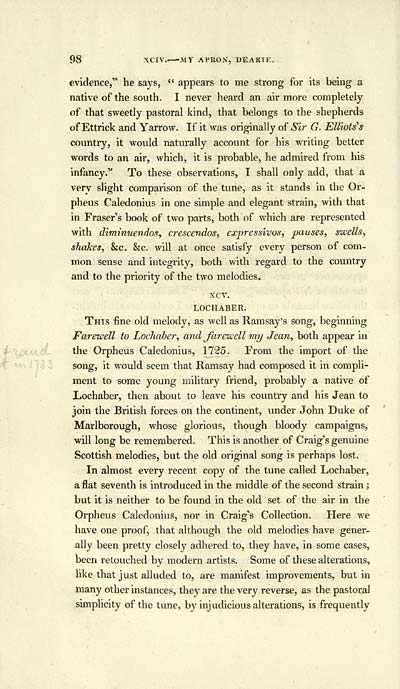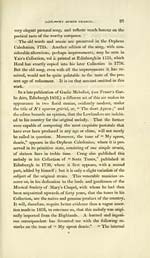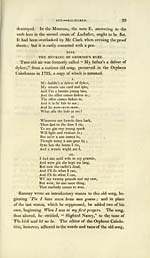Glen Collection of printed music > Printed text > Illustrations of the lyric poetry and music of Scotland
(238) Page 98 - Lochaber
Download files
Complete book:
Individual page:
Thumbnail gallery: Grid view | List view

98 XCIV.. — MY APUON, DEARIE.
evidence," he says, *' appears to me strong for its being a
native of the south. I never heard an air more completely
of that sweetly pastoral kind, that belongs to the shepherds
of Ettrick and Yarrow. If it was originally of Sir G. Elliots' s
country, it would naturally account for his writing better
words to an air, which, it is probable, he admired from his
infancy." To these observations, I shall only add, that a
very slight comparison of the tune, as it stands in the Or-
pheus Caledonius in one simple and elegant strain, with that
in Eraser's book of two parts, both of which are represented
with diminuendos^ crescendos^ expressivos, pauses, swells,
shakes, he. &c. will at once satisfy every person of com-
mon sense and integrity, both with regard to the country
and to the priority of the two melodies.
xcv.
LOCHABER.
This fine old melody, as well as Ramsay's song, beginning
Farewell to Lochaber, and farewell my Jean, both appear in
the Orpheus Caledonius, 1725. From the import of the
song, it would seem that Ramsay had composed it in compli-
ment to some young military friend, probably a native of
Lochaber, then about to leave his country and his Jean to
join the British forces on the continent, under John Duke of
Marlborough, whose glorious, though bloody campaigns,
will long be remembered. This is another of Craig's genuine
Scottish melodies, but the old original song is perhaps lost.
In almost every recent copy of the tune called Lochaber,
a flat seventh is introduced in the middle of the second strain ;
but it is neither to be found in the old set of the air in the
Orpheus Caledonius, nor in Craig's Collection. Here we
have one proof, that although the old melodies have gener-
ally been pretty closely adhered to, they have, in some cases,
been retouched by modern artists. Some of these alterations,
like that just alluded to, are manifest improvements, but in
many other instances, they are the very reverse, as the pastoral
simplicity of the tune, by injudicious alterations, is frequently
evidence," he says, *' appears to me strong for its being a
native of the south. I never heard an air more completely
of that sweetly pastoral kind, that belongs to the shepherds
of Ettrick and Yarrow. If it was originally of Sir G. Elliots' s
country, it would naturally account for his writing better
words to an air, which, it is probable, he admired from his
infancy." To these observations, I shall only add, that a
very slight comparison of the tune, as it stands in the Or-
pheus Caledonius in one simple and elegant strain, with that
in Eraser's book of two parts, both of which are represented
with diminuendos^ crescendos^ expressivos, pauses, swells,
shakes, he. &c. will at once satisfy every person of com-
mon sense and integrity, both with regard to the country
and to the priority of the two melodies.
xcv.
LOCHABER.
This fine old melody, as well as Ramsay's song, beginning
Farewell to Lochaber, and farewell my Jean, both appear in
the Orpheus Caledonius, 1725. From the import of the
song, it would seem that Ramsay had composed it in compli-
ment to some young military friend, probably a native of
Lochaber, then about to leave his country and his Jean to
join the British forces on the continent, under John Duke of
Marlborough, whose glorious, though bloody campaigns,
will long be remembered. This is another of Craig's genuine
Scottish melodies, but the old original song is perhaps lost.
In almost every recent copy of the tune called Lochaber,
a flat seventh is introduced in the middle of the second strain ;
but it is neither to be found in the old set of the air in the
Orpheus Caledonius, nor in Craig's Collection. Here we
have one proof, that although the old melodies have gener-
ally been pretty closely adhered to, they have, in some cases,
been retouched by modern artists. Some of these alterations,
like that just alluded to, are manifest improvements, but in
many other instances, they are the very reverse, as the pastoral
simplicity of the tune, by injudicious alterations, is frequently
Set display mode to: Large image | Transcription
Images and transcriptions on this page, including medium image downloads, may be used under the Creative Commons Attribution 4.0 International Licence unless otherwise stated. ![]()
| Special collections of printed music > Glen Collection of printed music > Printed text > Illustrations of the lyric poetry and music of Scotland > (238) Page 98 - Lochaber |
|---|
| Permanent URL | https://digital.nls.uk/91320025 |
|---|
| Description | Scottish songs and music of the 18th and early 19th centuries, including music for the Highland bagpipe. These are selected items from the collection of John Glen (1833 to 1904). Also includes a few manuscripts, some treatises, and other books on the subject. |
|---|
| Description | The Glen Collection and the Inglis Collection represent mainly 18th and 19th century Scottish music, including Scottish songs. The collections of Berlioz and Verdi collected by bibliographer Cecil Hopkinson contain contemporary and later editions of the works of the two composers Berlioz and Verdi. |
|---|

